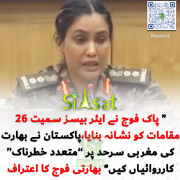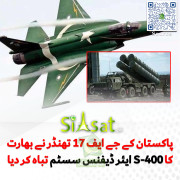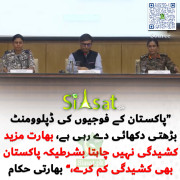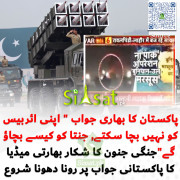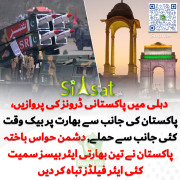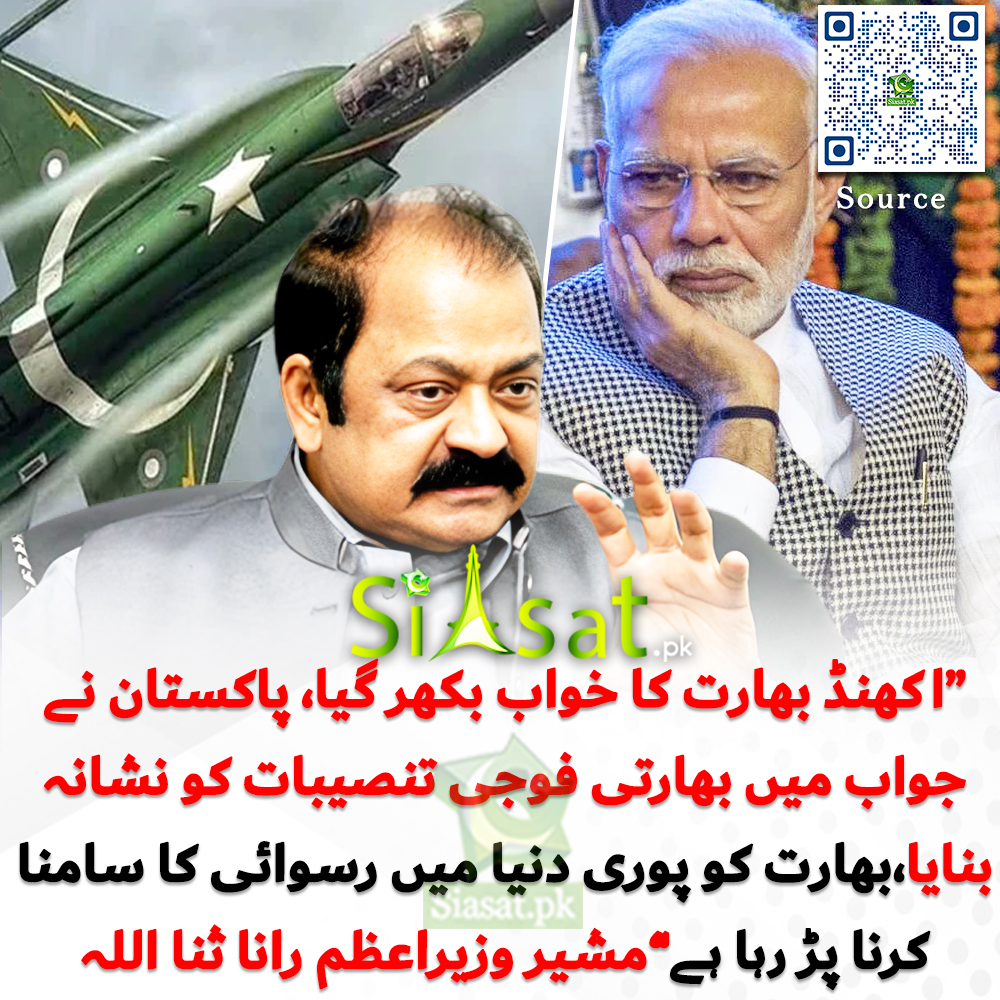A
arshad_lahore
Guest
Turning a new page?
Tuesday, June 09, 2009
Dr Maleeha Lodhi
The writer is a former envoy to the US and the UK, and a former editor of The News.
In his much heralded address to the world's 1.5 billion Muslims, President Barak Obama made a compelling case for a new beginning in long strained relations between the west and the Islamic world. In a masterly tour de force, cast in language seldom used by his predecessors, President Obama's speech hit many of the right notes and set a welcome tone of respect in an effort to redefine the relationship.
Cynics cast the speech as little more than a public relations exercise that "repackaged" unchanged US policies. While the speech may not have broken new policy ground and was purposively short on specifics, this rejectionist view minimizes the import of President Obama's effort at a rapprochement with the Muslim world and the possibilities this opens up.
President Obama himself acknowledged that one speech could not wipe away years of mistrust. But the vision he set out of charting a cooperative course on shared challenges marks a sharp departure from the with-us-or against-us paradigm of his predecessor. In seeking to build coalitions of consent, the president is also adapting to a globalized and interdependent world in which US power has been diminishing.
The Cairo speech marked President Obama's latest and most significant outreach to the Muslim world. After his inaugural address in which he called for a new way forward based on "mutual respect and mutual interests", he pressed this theme in an interview to the Saudi-owned Al Arabiya TV network, a videotaped message to the Iranian people on Nauroze, and his speech to the Turkish Parliament.
These public diplomacy initiatives, capped by the Cairo address, have several interrelated objectives, which include: a) to repair the image and standing of the US among Muslims that was especially battered during the Bush years; b) to create the atmosphere and space to restart the Middle East peace process; c) engage vigorously in the battle of ideas to drain support in the Muslim world for violent extremism; and d) to challenge Muslim communities to rethink some of their positions on issues ranging from religious freedom to Israel.
These objectives also reflect a national security imperative for the US: to defuse and neutralize the threat from violent extremism and reverse the rising tide of anti-Americanism in the Muslim world which feeds extremism.
That President Obama refrained from using the word terrorism in his speech represented an effort to break from the overarching template of US engagement with the Islamic world in the post 9/11 years. This aims at signalling that Washington's ties with Muslim countries will not be defined by this single prism even though, as President Obama declared in his speech, the US would "relentlessly confront violent extremists who pose a grave threat" to its security. And he reiterated what he told the Turkish Parliament: that America is not and never will be, "at war with Islam".
He listed seven issue areas which the US and the Muslim world had to confront jointly: violent extremism, the Arab-Israeli dispute, the nuclear issue and Iran, democracy, religious freedom, women's rights and economic opportunity.
The Cairo speech represents the most forthright public appraisal ever undertaken by a Western leader of the reasons why relations between the US and the Muslim world have plummeted to their lowest ever point a fact attested to by opinion polls conducted over the years. In his review of this troubled legacy, he mentioned colonialism, the proxy relationships of the cold war era, the wars of "choice" and "necessity" in Iraq and Afghanistan, the measures America took after 9/11 which were "contrary to its ideals" (Guantanamo), Palestine and the tensions generated by modernity and globalization.
In weaving into his speech a nuanced recognition of Muslim grievances President Obama demonstrated both a grasp of history and an ability to understand the Muslim narrative.
Disappointingly the speech did not show similar understanding and empathy for South and South West Asia. The history review made no mention of the US contribution albeit unwitting to the toxic mix of problems bequeathed to the region by the long campaign waged against the Soviet occupation of Afghanistan. Acknowledgement of the US role in waging this war of unintended consequences would have helped to remove the burden of history and signal to people in Pakistan that Washington was willing to accept its share of responsibility for the turmoil in the region.
The one-speech-cannot-address-everything argument doesn't hold ground on this count because explaining how and why violent extremism came to afflict this region is much too important to have been ignored in an address that tried to be fair to history.
The speech was also silent on Kashmir. An opportunity to win hearts and minds in Pakistan the world's second largest Muslim nation was missed by this omission. Calling for a peaceful settlement of a dispute that has locked South Asia in a cycle of conflict and mistrust and fed into the longstanding Muslim perception that US policy is not in favour of equitable solutions to Muslim issues, would have cost him little.
Mention of the issue would have been consistent with Obama's own assertions before his election that a Kashmir solution was essential for regional peace. And it would have raised his moral stature among Pakistanis and Kashmiris at a time of renewed turmoil in the Valley.
The centrepiece of his speech was the PalestinianIsraeli dispute, the issue that galvanizes Muslims everywhere and that has long come to symbolize their sense of historical grievance and injustice. Decades of uneven-handed policies that placed the security of Israel above any concern for justice for the Palestinian people and international law, alienated Muslims from the west. It is here that President Obama departed decisively from the past in signalling his determination to promote a settlement in as even-handed a manner as can be expected from an American President.
Although he did not lay out a detailed plan for Middle East peace, he set out the parameters for one. In his tone and language including "occupation" and "daily humiliations" of the Palestinian people he went further than any previous American President in aligning with the Muslim narrative. While describing his country's bond with Israel as "unbreakable", he delivered the sharpest public rebuke ever to Tel Aviv for its policy of settlements on the occupied West Bank.
Whether or not this marks an end to Washington's unqualified support for Israel, it does pitch the US as a neutral broker for the first time. By endorsing a two-state solution, President Obama sought to lay the ground to launch a vigorous round of diplomacy.
The litmus test of his promised change in relations with the Muslim world will be his ability to press Israel to accept a two-state solution consistent with the 2002 Saudi-framed Arab Peace Initiative. In coming months President Obama can be expected to engage in a battle of wills with the hard line Israeli leadership at a time when opinion polls in Israel show that the majority of people support a freeze on settlements.
The speech dealt with Afghanistan and Pakistan in a rather sketchy way. Whether or not this was a function of an address directed more to the Arab heartland than beyond, the impression it conveyed was of the lack of a strategic framework for Afghanistan.
While President Obama justified the 2001 military intervention in Afghanistan as a war of necessity, he rationalized the continued deployment of American troops there as aimed at preventing "violent extremists from killing Americans". Until the US is assured of its security its commitment to stay in Afghanistan "will not weaken", despite the costs. But he held out the assurance that the US did not seek a permanent military presence in that country, which will be welcomed in Pakistan and beyond.
President Obama reiterated that military power alone was not the answer to problems in Afghanistan and Pakistan. But the strategy he has rolled out so far remains at odds with this, placing too much reliance on military escalation, as signified by the troop surge in Afghanistan and intensified Drone attacks in Pakistan.
President Obama's eloquent call to "re-imagine" the world in which the US and the Muslim world partner to confront common challenges on the basis of shared values holds much promise. Whether his speech will turn a new page in a turbulent relationship will depend on what concrete policy actions will follow. It will also depend on how Muslim leaders take up the political and intellectual challenge and engage the US to chart a new and hopeful course.
Tuesday, June 09, 2009
Dr Maleeha Lodhi
The writer is a former envoy to the US and the UK, and a former editor of The News.
In his much heralded address to the world's 1.5 billion Muslims, President Barak Obama made a compelling case for a new beginning in long strained relations between the west and the Islamic world. In a masterly tour de force, cast in language seldom used by his predecessors, President Obama's speech hit many of the right notes and set a welcome tone of respect in an effort to redefine the relationship.
Cynics cast the speech as little more than a public relations exercise that "repackaged" unchanged US policies. While the speech may not have broken new policy ground and was purposively short on specifics, this rejectionist view minimizes the import of President Obama's effort at a rapprochement with the Muslim world and the possibilities this opens up.
President Obama himself acknowledged that one speech could not wipe away years of mistrust. But the vision he set out of charting a cooperative course on shared challenges marks a sharp departure from the with-us-or against-us paradigm of his predecessor. In seeking to build coalitions of consent, the president is also adapting to a globalized and interdependent world in which US power has been diminishing.
The Cairo speech marked President Obama's latest and most significant outreach to the Muslim world. After his inaugural address in which he called for a new way forward based on "mutual respect and mutual interests", he pressed this theme in an interview to the Saudi-owned Al Arabiya TV network, a videotaped message to the Iranian people on Nauroze, and his speech to the Turkish Parliament.
These public diplomacy initiatives, capped by the Cairo address, have several interrelated objectives, which include: a) to repair the image and standing of the US among Muslims that was especially battered during the Bush years; b) to create the atmosphere and space to restart the Middle East peace process; c) engage vigorously in the battle of ideas to drain support in the Muslim world for violent extremism; and d) to challenge Muslim communities to rethink some of their positions on issues ranging from religious freedom to Israel.
These objectives also reflect a national security imperative for the US: to defuse and neutralize the threat from violent extremism and reverse the rising tide of anti-Americanism in the Muslim world which feeds extremism.
That President Obama refrained from using the word terrorism in his speech represented an effort to break from the overarching template of US engagement with the Islamic world in the post 9/11 years. This aims at signalling that Washington's ties with Muslim countries will not be defined by this single prism even though, as President Obama declared in his speech, the US would "relentlessly confront violent extremists who pose a grave threat" to its security. And he reiterated what he told the Turkish Parliament: that America is not and never will be, "at war with Islam".
He listed seven issue areas which the US and the Muslim world had to confront jointly: violent extremism, the Arab-Israeli dispute, the nuclear issue and Iran, democracy, religious freedom, women's rights and economic opportunity.
The Cairo speech represents the most forthright public appraisal ever undertaken by a Western leader of the reasons why relations between the US and the Muslim world have plummeted to their lowest ever point a fact attested to by opinion polls conducted over the years. In his review of this troubled legacy, he mentioned colonialism, the proxy relationships of the cold war era, the wars of "choice" and "necessity" in Iraq and Afghanistan, the measures America took after 9/11 which were "contrary to its ideals" (Guantanamo), Palestine and the tensions generated by modernity and globalization.
In weaving into his speech a nuanced recognition of Muslim grievances President Obama demonstrated both a grasp of history and an ability to understand the Muslim narrative.
Disappointingly the speech did not show similar understanding and empathy for South and South West Asia. The history review made no mention of the US contribution albeit unwitting to the toxic mix of problems bequeathed to the region by the long campaign waged against the Soviet occupation of Afghanistan. Acknowledgement of the US role in waging this war of unintended consequences would have helped to remove the burden of history and signal to people in Pakistan that Washington was willing to accept its share of responsibility for the turmoil in the region.
The one-speech-cannot-address-everything argument doesn't hold ground on this count because explaining how and why violent extremism came to afflict this region is much too important to have been ignored in an address that tried to be fair to history.
The speech was also silent on Kashmir. An opportunity to win hearts and minds in Pakistan the world's second largest Muslim nation was missed by this omission. Calling for a peaceful settlement of a dispute that has locked South Asia in a cycle of conflict and mistrust and fed into the longstanding Muslim perception that US policy is not in favour of equitable solutions to Muslim issues, would have cost him little.
Mention of the issue would have been consistent with Obama's own assertions before his election that a Kashmir solution was essential for regional peace. And it would have raised his moral stature among Pakistanis and Kashmiris at a time of renewed turmoil in the Valley.
The centrepiece of his speech was the PalestinianIsraeli dispute, the issue that galvanizes Muslims everywhere and that has long come to symbolize their sense of historical grievance and injustice. Decades of uneven-handed policies that placed the security of Israel above any concern for justice for the Palestinian people and international law, alienated Muslims from the west. It is here that President Obama departed decisively from the past in signalling his determination to promote a settlement in as even-handed a manner as can be expected from an American President.
Although he did not lay out a detailed plan for Middle East peace, he set out the parameters for one. In his tone and language including "occupation" and "daily humiliations" of the Palestinian people he went further than any previous American President in aligning with the Muslim narrative. While describing his country's bond with Israel as "unbreakable", he delivered the sharpest public rebuke ever to Tel Aviv for its policy of settlements on the occupied West Bank.
Whether or not this marks an end to Washington's unqualified support for Israel, it does pitch the US as a neutral broker for the first time. By endorsing a two-state solution, President Obama sought to lay the ground to launch a vigorous round of diplomacy.
The litmus test of his promised change in relations with the Muslim world will be his ability to press Israel to accept a two-state solution consistent with the 2002 Saudi-framed Arab Peace Initiative. In coming months President Obama can be expected to engage in a battle of wills with the hard line Israeli leadership at a time when opinion polls in Israel show that the majority of people support a freeze on settlements.
The speech dealt with Afghanistan and Pakistan in a rather sketchy way. Whether or not this was a function of an address directed more to the Arab heartland than beyond, the impression it conveyed was of the lack of a strategic framework for Afghanistan.
While President Obama justified the 2001 military intervention in Afghanistan as a war of necessity, he rationalized the continued deployment of American troops there as aimed at preventing "violent extremists from killing Americans". Until the US is assured of its security its commitment to stay in Afghanistan "will not weaken", despite the costs. But he held out the assurance that the US did not seek a permanent military presence in that country, which will be welcomed in Pakistan and beyond.
President Obama reiterated that military power alone was not the answer to problems in Afghanistan and Pakistan. But the strategy he has rolled out so far remains at odds with this, placing too much reliance on military escalation, as signified by the troop surge in Afghanistan and intensified Drone attacks in Pakistan.
President Obama's eloquent call to "re-imagine" the world in which the US and the Muslim world partner to confront common challenges on the basis of shared values holds much promise. Whether his speech will turn a new page in a turbulent relationship will depend on what concrete policy actions will follow. It will also depend on how Muslim leaders take up the political and intellectual challenge and engage the US to chart a new and hopeful course.

